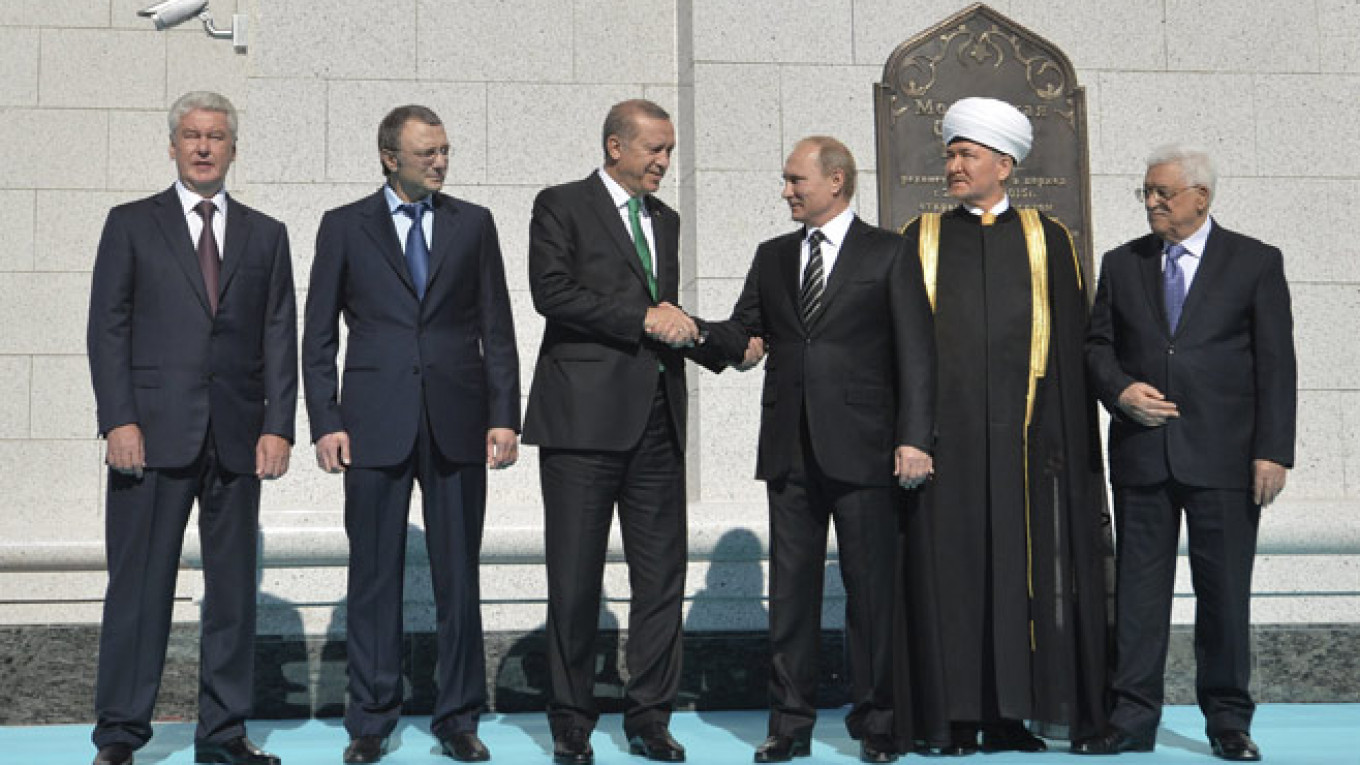Turkish President Recep Erdogan on Wednesday became the third Middle Eastern leader in as many days to hold talks with President Vladimir Putin in Moscow as the Kremlin appears to be building its military capability inside war-torn Syria and looks for a more assertive role in the region.
Putin held talks with Palestinian leader Mahmoud Abbas on Tuesday and received Israeli Prime Minister Benjamin Netanyahu on Monday.
The diplomatic shuttling appears to be a response to a build-up of Russian forces around a Kremlin-controlled naval base on Syria's Mediterranean coast. U.S. officials claim Russia has placed fighter jets, tanks, air-defense systems and armored personnel carriers in the area in recent weeks, but Russia denies its military deployment is anything unusual.
"Russia has sharply increased its work, presence and interest in Syria … it is completely natural that the key players in the region want to know what Russia is planning," Fyodor Lukyanov, editor of the Russia in Global Affairs journal, told The Moscow Times.
The visits of Netanyahu, Abbas and Erdogan have been high profile, but Moscow has been stepping up its diplomatic contact with Middle Eastern countries for weeks.
Putin had a telephone call last week with the king of Saudi Arabia, Salman bin Abdulaziz Al Saud, and the leaders of Egypt, Abu Dhabi and Jordan have all been in Moscow within the last two months.
"Russia already has a tactical vision," said Lukyanov.
Earlier this month, Putin said Russia wanted to put together a coalition of countries to fight the notoriously violent and fundamentalist Islamic State, deemed a terrorist organization by Russia and other nations, which currently controls large swathes of territory in Iraq and Syria.
"I have spoken about this question with the president of Turkey, with the leadership of Saudi Arabia, with the king of Jordan, with the president of Egypt and our other partners, we are in contact with military agencies, and recently, the leaders of the general headquarters of countries close to this conflict came to Moscow," Putin told reporters on Sept. 4.
Contact between Washington and Moscow — at odds over the Ukraine conflict — has appeared to restart over Syria. U.S. Defense Secretary Ashton Carter on Friday spoke to Russian Defense Minister Sergei Shoigu, while Putin has also said he spoke to his U.S. counterpart Barack Obama about the issue.
Assessing Positions
Moscow has long backed the Syrian government of President Bashar Assad — while the United States and its key regional allies, including Turkey and Saudi Arabia, maintain their opposition to Assad, who they claim is responsible for tens of thousands of civilian deaths.
More than 250,000 people have been killed in Syria since a 2011 government crackdown on pro-democracy protesters spiraled into civil war, triggering the rise of Islamic State.
Neither Putin nor Erdogan — whom Putin last year described as a "tough guy" — gave any details about their talks Wednesday, but they both said that they had discussed the international situation.
While in Moscow with top generals Monday, Netanyahu said he had agreed how to coordinate Russian and Israeli military action in Syria so as to avoid accidentally trading fire.
But experts said the visits were not just fact-finding missions by Middle Eastern countries, but were also significant to Moscow as it fine-tunes its strategy in the region.
"For Russia it is important to understand the position of these countries if a political solution is to be possible for the Syrian crisis," said Vladimir Sotnikov, a senior research assistant at the Russian Academy of Science's Oriental Studies Institute.
UN Platform
Putin will address the United Nations General Assembly on Monday in a speech that many expect to focus on the battle with the Islamic State and a possible solution to Syria's civil war.
"We think that it is essential to seek your advice about what steps could be taken at the UN," Abbas told Putin on Tuesday, according to the Kremlin website. "We think that a very important moment has come [in Syria] when the moment for a political solution has arrived, when the door has opened to a political settlement."
A much-discussed meeting between Putin and Obama at the United Nations will go ahead, the state-owned Russian news agency TASS reported Wednesday, citing unidentified sources.
Increasing unhappiness with Obama's policies in the Middle East has made leaders more willing to look to Russia for fresh solutions, according to Yelena Suponina, an adviser to the director of the Institute for Strategic Studies, a Moscow-based think tank that advises the government.
"Against the background of disappointment with America, people are turning toward Russia," she said. "Moscow stands at a crossroads."
Contact the author at h.amos@imedia.ru
A Message from The Moscow Times:
Dear readers,
We are facing unprecedented challenges. Russia's Prosecutor General's Office has designated The Moscow Times as an "undesirable" organization, criminalizing our work and putting our staff at risk of prosecution. This follows our earlier unjust labeling as a "foreign agent."
These actions are direct attempts to silence independent journalism in Russia. The authorities claim our work "discredits the decisions of the Russian leadership." We see things differently: we strive to provide accurate, unbiased reporting on Russia.
We, the journalists of The Moscow Times, refuse to be silenced. But to continue our work, we need your help.
Your support, no matter how small, makes a world of difference. If you can, please support us monthly starting from just $2. It's quick to set up, and every contribution makes a significant impact.
By supporting The Moscow Times, you're defending open, independent journalism in the face of repression. Thank you for standing with us.
Remind me later.


